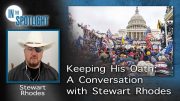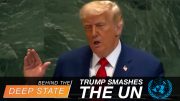The man who delightedly accepted the title of neoconservatism’s “godfather” passed away on September 18 at age 89. Sad to report, the neoconservatism Irving Kristol fastened on conservative Republicans endures, and it is not good for America.
After years as an unabashed youthful Trostskyite in New York City, Kristol claimed that the excesses of the New Left in the 1960s and the crimes of communism drove him into the Republican Party. But in his 1995 book Neoconservatism: The Autobiography of an Idea, he stated, “I regard myself as lucky to have been a young Trotskyite and I have not a single bitter memory.”
Younger Americans know little of Leon Trotsky, the lesser-known partner of Vladimir Lenin who teamed with the more famous Russian thug to convert their nation into one of history’s bloodiest tyrannies. After Lenin’s death, Trotsky then partnered with the more ruthless Josef Stalin before being denounced and exiled as the result of a power struggle. Murdered in Mexico by one of Stalin’s agents, Trotsky then became a hero to international socialists who always favored the tyranny of big government and centralized power, but they wanted it chosen by people rather than forcing it down people’s throats with police state brutality.
Praised for his so-called contributions to the conservative movement and the Republican Party, Kristol was much more the personification of a Trojan Horse within America’s right wing. His own definition of the movement he launched, given in his 1995 book, claimed that neoconservatism “accepted the New Deal in principle, and had little affection for the kind of isolationism that then permeated American conservatism.”
Accepting FDR’s socialism and rejecting America’s tradition of minding one’s own business and avoiding entangling alliances defines what it means to be a Trotskyite. Also a strong supporter of the United Nations, Kristol never ceased being Trotsky’s disciple.
Unceasingly injecting his views into many within the GOP, Kristol could claim as neoconservative step-children the likes of William Bennett, Jeane Kirkpatrick, Dick Cheney, and a host of officials in the George W. Bush administration. Given stature by his books and his own publication, The National Interest, Kristol’s influence had earlier solidly invaded the Reagan administration, courtesy of Jack Kemp.
In June 1991, Kristol used the pages of the Wall Street Journal to bare details about an invitation-only conference for “two dozen conservative leaders” sponsored by William F. Buckley’s National Review. Neoconservatism’s godfather enthusiastically reported that upon arrival the attendees “regarded themselves as conservatives first and Republicans second” but left with their priorities completely reversed. They were now Republicans first and supporters of the first President Bush’s increased taxation, expansion of federal powers, use of U.S. armed forces to enforce UN Security Council resolutions, and other elements of neoconservatism.
Buckley himself, regarded by many as the paragon of conservatism, had become a clever promoter of neoconservatism’s socialism and internationalism. The neocons had so successfully stolen the conservative label that columnist Sam Francis could write in 1993 that “the whole concept of conservatism in American is totally devoid of meaning, in large part because conservatives made the seminal error of allowing dilettantes like Mr. Buckley define it for them in the first place.” Anyone who cares to learn the hidden truths about Buckley’s many betrayals can find them in my own 2002 book, William F. Buckley, Jr.: Pied Piper for the Establishment.
Americans who formerly approved being called “conservative” have lately preferred being labeled “constitutionalist.” But not “American Values” leader Gary Bauer, considered a conservative leader by many. Obviously a neoconservative himself, Bauer paid tribute to the fallen neocon godfather by claiming, “It is impossible to imagine modern American conservatism without the powerful intellect of Irving Kristol.” He’s correct about that. But note that Bauer referred not just to conservatism but to “modern” conservatism, another term for the neoconservatism that is the legacy of Irving Kristol.
— Photo: AP Images




